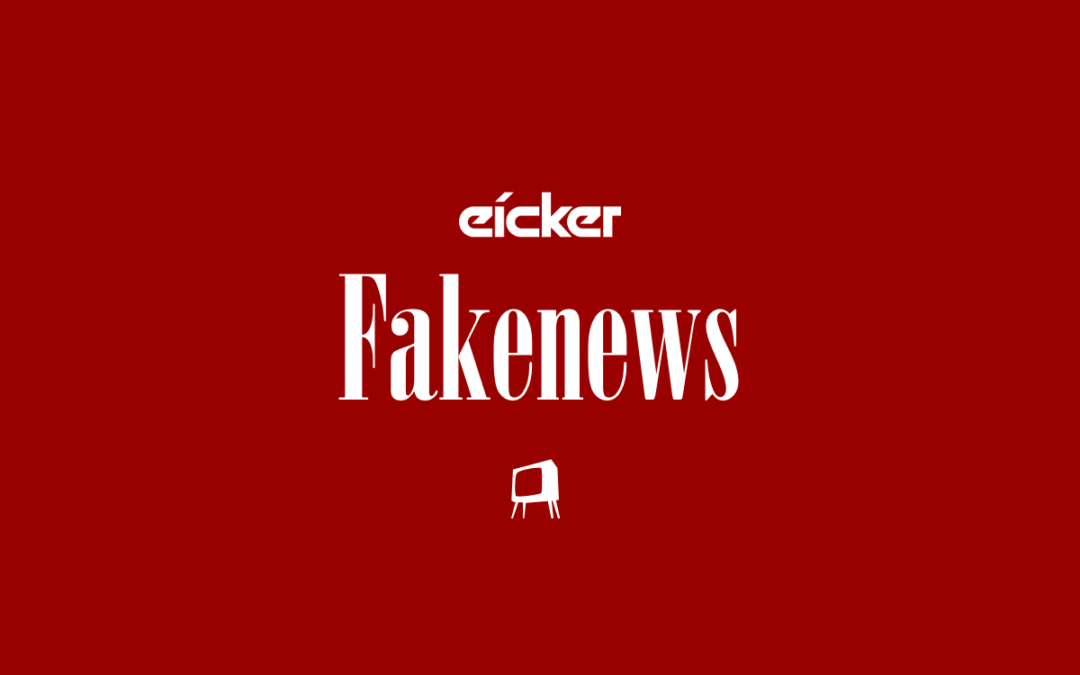eicker.TV gibt es als Vlog auf YouTube, TikTok, Instagram und zusätzlich als Podcast auf SoundCloud: Der Podcast kann bei Apple, Google, Spotify und über viele weitere Podcastclients abonniert werden.
„Internet’s largest social networks issue joint statement on COVID-19 misinformation – Facebook, Google, LinkedIn, Microsoft, Reddit, Twitter, and YouTube put out joint statement promising to fight COVID-19 fraud and curb misinformation. … During the teleconference, which allegedly lasted for more than two hours, US government officials asked US tech companies to help stop the spread of coronavirus conspiracy theories online, among other things.“
ZDNet
„Coronavirus: Verbreitung von Falschinformationen über WhatsApp – Über WhatsApp und soziale Medien werden falsche und zweifelhafte Informationen zum Umgang mit dem Coronavirus verbreitet.“
Heise
„So erkennen Sie, welche Nachrichten zum Coronavirus stimmen – Aktuell verbreiten sich gezielte Lügen und auch Panikmache zur Sars-CoV-2-Pandemie. Neun Tipps, wie Sie Behauptungen auf WhatsApp, Facebook und in Medien prüfen können. 1. Wenn Sie im Netz etwas Neues über das Virus erfahren, denken Sie nicht sofort, Sie hätten es schon vorher gewusst. 2. Wie unser Gehirn eine Behauptung verarbeitet, hängt auch von den verwendeten Wörtern ab. 3. Suchen Sie nicht nach Informationen, die Ihre Auffassungen über das Virus bestätigen. 4. Zweifeln Sie an dem, was Sie selbst und andere über das Virus zu wissen glauben oder für richtig halten. 5. Folgt auf Ereignis A ein Ereignis B, gehen Menschen meist unbewusst davon aus, dass beide zusammenhängen. 6. Verlassen Sie sich im Netz und im Umgang mit Medien nicht auf den ‚gesunden Menschenverstand‘. 7. Menschen halten Ereignisse für wahrscheinlicher, je verfügbarer sie in ihrem Gedächtnis sind. 8. Achten Sie auf Argumente, die gar keine sind. 9. Und ganz wichtig: Unterschätzen Sie nicht die Wirkung von Fehlinformationen.“
Zeit
Quarantäne war niemals bequemer
„You Already Live in Quarantine – Being holed up at home has never been more pleasant. … The answer is far more familiar than the fearful conjecture forebodes. Many Americans would do the same thing they do now, mostly. Netflix has already fused us to our couches. For years, contemporary society has been bracing, and even longing, for quarantine.“
The Atlantic
Amazon sucht 100.000 Mitarbeiter
„Amazon ramps hiring, opening 100,000 new roles to support people relying on Amazon’s service in this stressful time – Company will invest over $350 million globally to increase pay by $2/hour in the U.S., £2/hr in the UK, and approximately €2/hr in many EU countries for employees and partners who are in fulfillment centers, transportation operations, stores or those making deliveries so that others can remain at home.“
Amazon
Zoom: mehr als Videokonferenzen
„Zoom conquered video chat – now it has even bigger plans – Before coronavrius locked workers at home, Zoom was a leading videoconferencing tool. But it wants to be more. It wants to be your whole office. … 150 milliseconds, the maximum latency before conversations feel unnatural. Zoom works really hard to stay under 150 milliseconds, Chief Product Officer Oded Gal said. Or maybe this: Rather than optimize the connection for all devices – which means optimizing for the worst, slowest one – Zoom tends to each individually.“
Protocol
GitHub kauft Npm
„Npm is joining GitHub – he work of the npm team over the last 10 years, and the contributions of hundreds of thousands of open source developers and maintainers, have made npm home to over 1.3 million packages with 75 billion downloads a month. Together, they’ve helped JavaScript become the largest developer ecosystem in the world.“
GitHub
TikTok zensiert „Hässlichkeit“
„Invisible Censorship – TikTok Told Moderators to Suppress Posts by ‚Ugly‘ People and the Poor to Attract New Users – The makers of TikTok, the Chinese video-sharing app with hundreds of millions of users around the world, instructed moderators to suppress posts created by users deemed too ugly, poor, or disabled for the platform, according to internal documents obtained by The Intercept. These same documents show moderators were also told to censor political speech in TikTok livestreams, punishing those who harmed ’national honor‘ or broadcast streams about ’state organs such as police‘ with bans from the platform.“
The Intercept
